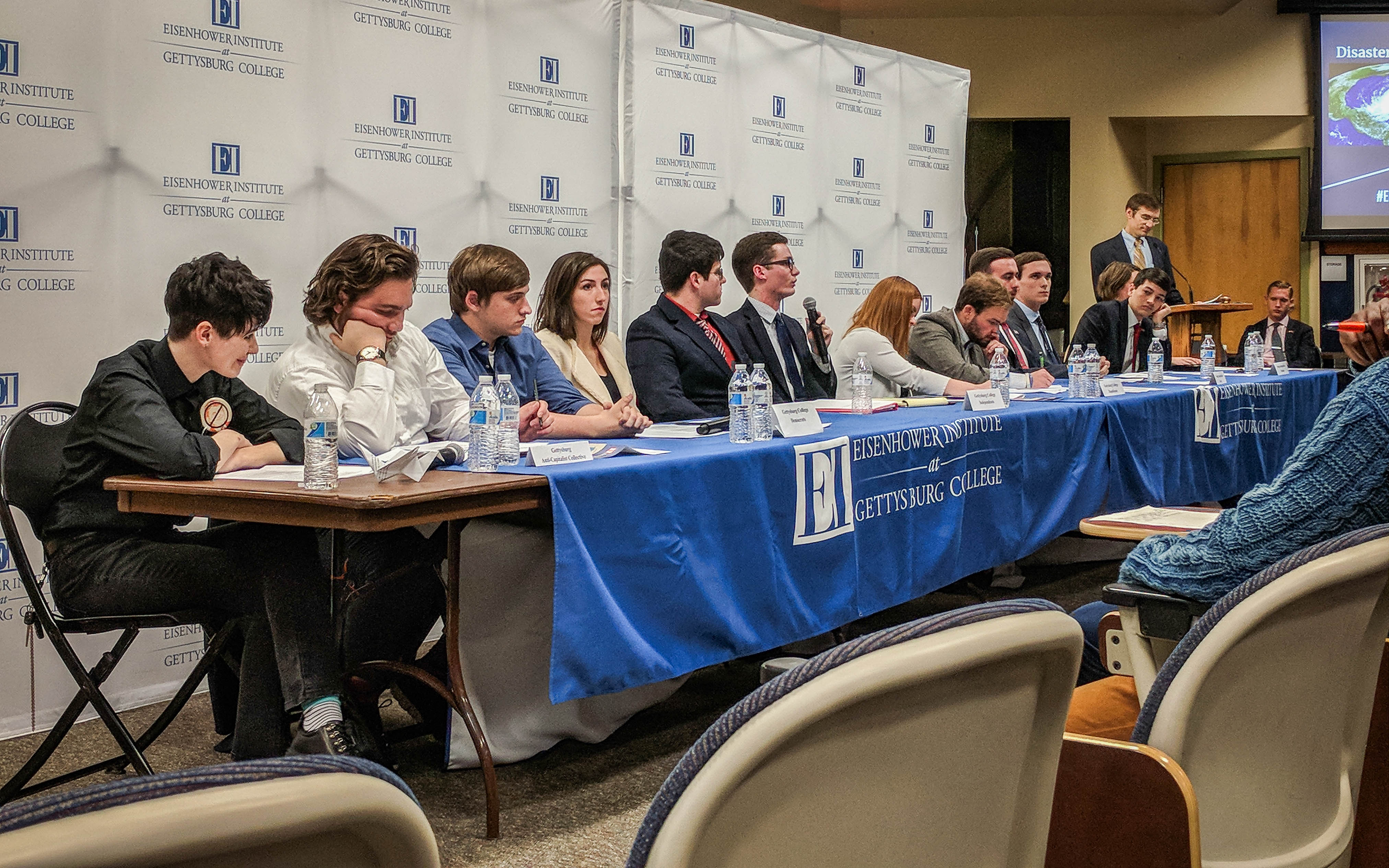An Antidote For Authoritarianism

Christopher Condon was among the participants at the Fall 2017 Eisenhower Institute Policy Debate (Photo Mary Frasier / The Gettysburgian)
By Christopher Condon, Guest Columnist
Throughout the history of the United States, authoritarianism has reared its ugly head repeatedly, often through the use of crises created by authoritarians themselves to promote their agenda. America is currently in such a state, with issues of the 21st century raising many of the tired, disproven, and debunked ideas from the ash heap of history. Liberalism has given way to hypersensitivity and identity politics, and conservatism has yielded to mass surveillance and the beginnings of a militarized police state. Under such conditions, it is well to remember the principles that brought the United States to the forefront of the global order and what has made us the most prosperous nation in the history of mankind.
These principles are rooted first and foremost in the Constitution of the United States, which provides the rich soil that nurtures the tree of liberty. While there are now those who argue that this document has outlived its use and should be radically altered or scrapped entirely, this sentiment could not be further from the truth. We have seen our nation’s most sacred ideals disregarded and abused at the most vulnerable points in our history, and the results have most often become stains on the fabric of our national character. When we disregard the ideals of liberty as expressed by the founders, we allow the winds of authoritarianism to blow us ever closer to the shores of obscurity.
The Second Amendment is, at its core, one of the purest expressions of liberty as perceived by the framers, informed by the injustices they suffered at the hands of tyrannical government. By attempting to ensure that the general citizenry would have access to arms for their own defense, the founders solidified their belief that Americans would never again be forced to kneel to the whims of a militaristic executive that expands beyond its purview. In essence, the right to bear arms is the mechanism by which the framers protect the other rights, placing this tool in the hands of those it seeks to benefit most. Although many treat the survival of widespread gun ownership as a negative consequence of interest groups, the preservation of the Second Amendment was in fact the desire of the founders and is essential in the protection of the entire Bill of Rights.
Hand in hand with the Second Amendment comes the constitutional guarantee of due process, both procedural and substantive. By stating that we should deprive American citizens of their right to bear arms based on arbitrary conceptions of mental illness without so much as an appearance before a judge, advocates of so-called “law and order gun control” show a gross misunderstanding of this fundamental liberty. Due process is also instructive in the debate over how to resolve America’s immigration woes; while many would argue that constitutional rights do not apply to those who do not carry the privilege of American citizenship, is our nation not founded on the proposition that all men are created equal? Should we not afford the same liberties to all who we encounter? When we begin to accept the notion that government should turn away those who desire most to live and work among us without due consideration, we turn away from the magnanimous nature that characterizes the American spirit.
Equally offensive as an ignorance of the Second Amendment and of due process to the American ethos is blatant ignorance toward the role of the executive in good governance. While America has historically thrived without the shadow of an overbearing executive (by design), there have always been those who have sought to impose this shadow over the nation. By advocating that the president should have the unilateral power to bypass the legislature (representatives of the people) on matters of the utmost consequence, these authoritarians pose a grave danger to the very thread that binds our nation together. Stating that the president has the “power of the sword” is simply incorrect, and this notion leads us down the path of the most repressive regimes in the history of humanity.
Perhaps President Jefferson expressed these sentiments most eloquently in stating “I would rather be exposed to the inconveniences attending too much liberty than those attending too small a degree of it.” The immortal words of Jefferson in the Declaration of Independence and his principles realized in the Bill of Rights have become endangered by the reckless totalitarian sympathies of small groups on the left and right. Although these groups begin as isolated fringe movements, humanity has seen them blossom into influential leviathans all too often. While the prominence of interest groups and money in American institutions is a topic that must be discussed, this issue’s clumsy use as a cover for the suggestion that fundamental liberties should be curtailed is preposterous. Perhaps proponents of “law and order” should examine the Constitution of the United States, the most serious expression of law and political principles in the history of mankind.

February 26, 2018
This is a very interesting and well thought out article that provides a very nuanced perspective on such a tough topic! I learned a lot about an issue that I’m not particularly knowledgeable in.
March 6, 2018
“There’s just the problem that authoritarian followers would often rather be nailed to a cross than thrice deny their leader before the cock crows.” Agree with all but that. Authoritarians lack the courage to act on their deeply held convictions because they are not developed innately. Rather they are appropriated without critical thought from those in the echo chamber. Without the deep seated convictions borne of intentional consideration of many different perspectives, those authoritarians are much more likely to sell anyone out that threatens their narrow interests.